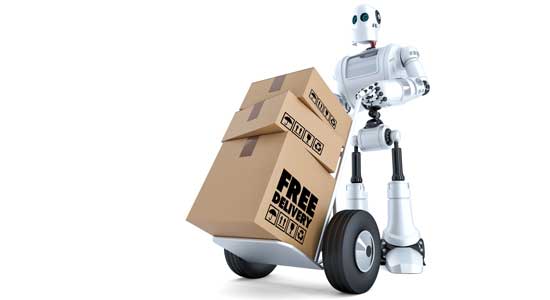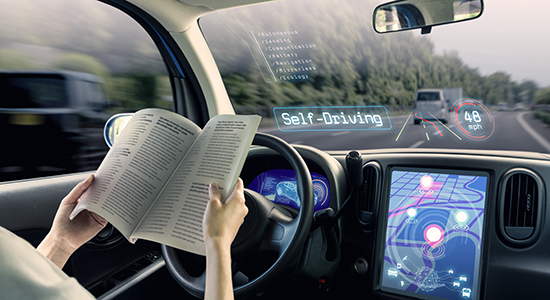Tech Tip
Delivery Robots

In June, Wisconsin became the third state to allow “delivery robots” that can use crosswalks and sidewalks to deliver goods to people’s homes. Idaho and Virginia also allow it.
“The Wisconsin law places an 80-pound weight limit on the robots and doesn’t permit the machines to travel faster than 10 miles per hour. The robots are also required to have a person in the loop to take over control in case something goes awry,” wrote April Glaser at Recode.
A company called Starship Technologies is one of the major players in this space. According to Mashable, it has developed six-wheeled bots that weigh 40 pounds and can carry 20 pounds of supplies.
“Wisconsin has joined the land of autonomous delivery,” wrote Colin Daileda at Mashable. “If you live in the Badger State, you can now legally have your award-winning cheeses delivered to you 20 pounds at a time.”
By the Numbers
10,000
The number of jobs the legal sector has gained in the last year, according to statistics from the U.S. Bureau of Labor Statistics.
In June 2016, there were 1.12 million jobs in legal services. As of June 2017, there were 1.13 million.
However, growth still looks stagnant for first-year hires. A 2017 Altman Weil survey indicated first-year associate hiring will stay the same or decrease in the next five years at nearly half the firms surveyed.
“That’s not a rosy outlook for associates,” Altman Weil consultant Eric Seeger told Am Law Daily. He noted that partners just “have less work to throw at associates.”
Quotable
“From time to time in the years to come, I hope you will be treated unfairly so that you will come to know the value of justice.”

– U.S. Supreme Court Chief Justice John G. Roberts, in a ninth-grade commencement address to students at his son’s boarding school.
“I hope that you will suffer betrayal, because that will teach you the importance of loyalty. Sorry to say, but I hope you will be lonely from time to time, so that you don’t take friends for granted,” Roberts said.
“I wish you bad luck – again, from time to time – so that you will be conscious of the role of chance in life, and understand that your success is not completely deserved, and that the failure of others is not completely deserved, either.
“And when you lose, as you will, from time to time, I hope every now and then your opponent will gloat over your failure as a way for you to understand the importance of sportsmanship. I hope you will be ignored, so you know the importance of listening to others. And I hope you will have just enough pain to learn compassion.”
Source: Time.com
Out There
Driverless Car Litigation

In May, an Ohio man died while riding in his Tesla Model S, which has autopilot capabilities. The car can drive itself, but the driver can intervene and take over. It’s not fully autonomous.
According to the ABA Journal, Joshua Brown was the first-ever fatality in a semi-driverless car accident. Apparently, a vehicle camera designed to scan the roadway failed to recognize a tractor-trailer that was crossing the highway.
The National Highway Traffic Safety Administration (NHTSA) concluded that Brown was responsible for the crash – not any defect in the car’s design or performance – because the vehicle was only designed to prevent rear-end collisions. If Brown was paying attention, he would have had seven seconds to respond, the NHTSA noted.
Under current law, drivers cannot delegate driving responsibilities to cars. Thus, according to an ABA report, “Tesla avoided liability for [Brown’s] death because Autopilot was intended to aid, not replace, human drivers.”
But Tesla and other car companies are developing fully autonomous cars, or highly automated vehicles (HAVs), designed to drive themselves without human intervention. For lawyers, liability will be the big question.
“Multiple defendants are possible: the company that wrote the car’s software; the businesses that made the car’s components; the automobile manufacturer; maybe the fleet owner, if the car is part of a commercial service, such as Uber,” Gary E. Marchant, director of the Center for Law, Science and Innovation at the Sandra Day O’Connor College of Law at Arizona State University, told the ABA Journal.
“How would you prove which aspect of the HAV failed and who should be the liable party?”
Out There
Pokémon No: Milwaukee Restricts Reality Mobile Games

Have you heard of Pokémon Go? It is a free-to-play, location-based reality game that uses players’ mobile device GPS ability to locate, capture, battle, and train virtual creatures. These creatures, Pokémon, appear on the screen as if they were at the same real-world location as the player.
Lots of people play, attracting large groups to various locations. In a Milwaukee County park, large crowds gathered on multiple days last summer, resulting in littering, unauthorized vendors, traffic congestion, park violations, trampled grass, and neighbor complaints.
As a result, Milwaukee County enacted an ordinance requiring companies that produce “virtual and location-based augmented reality games” to obtain a permit before using county parks in the games. One of those companies has sued Milwaukee County in federal court, arguing the ordinance is an unlawful content-based regulation of speech.
Source: Hollywood Reporter
Headlines
LSC Funding: Deep Cuts Ahead?

The Legal Services Corporation (LSC), the single largest funder of civil legal aid in the United States, including in Wisconsin, may experience deep cuts as Congress works through a federal budget. In June, the U.S. House of Representatives Appropriations Committee proposed $300 million to fund LSC for fiscal year 2018, an $85 million cut in funding (down 24 percent) from 2017. As of press time, this is where LSC funding stood.
LSC, created by Congress in 1974, had requested about $528 million to serve the civil legal needs of poor Americans. LSC provides major funding to Wisconsin Judicare and Legal Action of Wisconsin, two longstanding legal aid organizations that annually serve thousands of Wisconsin residents.
Meanwhile, LSC recently released its 2017 Justice Gap Report, which shows that 71 percent of low-income households experienced at least one civil legal problem in the last year – including problems with health care, housing conditions, disability access, veterans’ benefits, and domestic violence. And, 86 percent of the civil legal problems reported by low-income Americans received inadequate or no legal help.
Cutting LSC funding will only hurt low-income Americans more. The State Bar of Wisconsin has long supported funding to provide civil legal assistance by lawyers to low-income residents.
To help the LSC cause, visit HelpLegalAid.org or DefendLegalAid.org.
